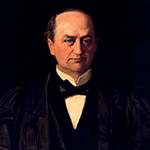
David Josiah Brewer (1890-1910)
Lived from 1837 to 1910.
Early Life and Legal Career
Brewer was born on June 20, 1837 to Emilia Field Brewer and Reverend Josiah Brewer. At the time of his birth, Brewer’s parents were operating a school for Greeks in Smyrna, Ottoman Empire. In 1838, the Brewer family returned to the United States, settling in Connecticut. Brewer attended college at Wesleyan University where he was a member of the Mystical 7 Society. After his graduation from Wesleyan in 1854, Brewer enrolled in Yale University, graduating Phi Beta Kappa two years later. Following his graduation from Yale, Brewer read law for one year in the office of his uncle, David Dudley Field. He then attended Albany Law School in Albany, New York, graduating in 1858.
After graduating from law school, Brewer moved to Kansas City, Missouri. Shortly thereafter, he left Missouri for Colorado in search of gold, eventually returning empty-handed. In 1859, Brewer settled in Leavenworth, Kansas. He was named Commissioner of the Federal Circuit Court in Leavenworth in 1861, but left the court a year later to become a judge in the Probate and Criminal Courts. In 1865, Brewer changed courts once again, becoming a judge to the First Judicial District of Kansas. Brewer left the First District in 1869, accepting a position as city attorney of Leavenworth. In 1870, Brewer was elected to the Kansas Supreme Court, where he remained for fourteen years.
Appointment to the Supreme Court
On December 4, 1889, Brewer was nominated to the United States Supreme Court by President Benjamin Harrison. He was confirmed by the Senate on December 18, and received his commission the same day. Brewer was joined on the Court by his uncle, Stephen J. Field. Recognized as one of the most influential justices of his time, Brewer was a vigorous defender of the rights of minorities. He was an active member of the Court, often writing in both concurring and dissenting opinions.
Brewer contributed significantly to the doctrine of substantive due process, arguing that certain activities are entirely outside of government control. Additionally, he frequently sided with the Court’s majorities that struck down property right restrictions. In Muller v. Oregon, Brewer was the author of the unanimous opinion of the Court, which supported a law restricting working hours for women. He also authored the Court’s opinion in In re Debs, which upheld federal injunctions to suppress labor strikes. Brewer served on the court for twenty years until his death.
Death
Brewer died on March 28, 1910 in Washington, D.C. at the age of 72.







